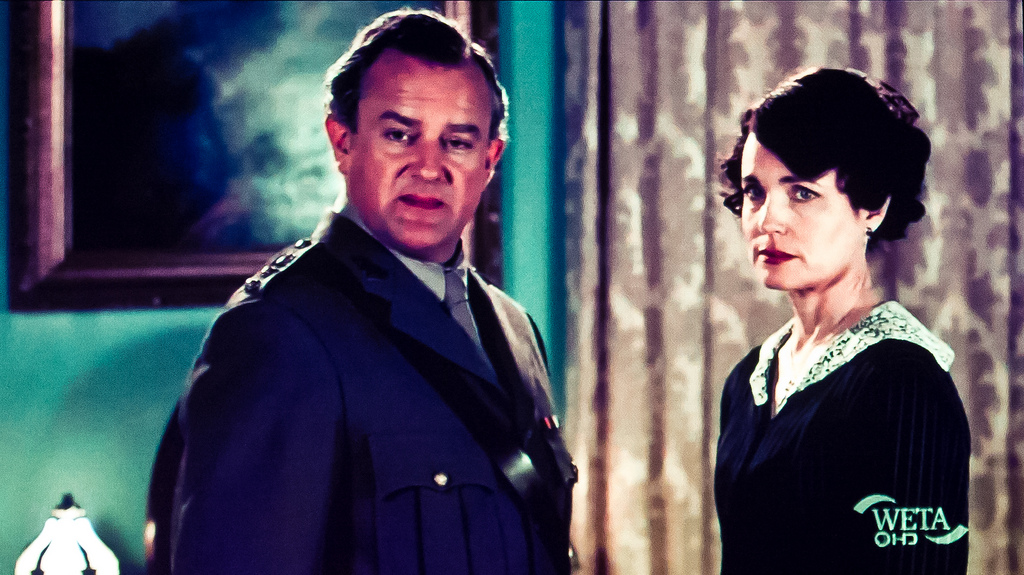One episode of Downton Abbey is like a burst of cold air in a stale room. It’s a sort of lifeline to any woman drowning in the thick waters of modern culture. It’s as if the show’s matriarch, the Dowager Countess, is speaking right at us when she offers her witticisms and wisdoms, slowly pulling us out of the mud.
There is a very strange phenomenon that has taken root among today’s educated women: we love garbage television. The Real Housewives. Desperate Housewives. The Bachelor. Teen Mom. Jersey Shore. Gossip Girl. Oh, my!
Viewership of shows like these is not limited to teenaged girls not exactly pouring over ACT study books. In fact, these shows largely stay in business because of women who likely aced their ACTs. Women who work twelve-hour days, listen to NPR on the drive home, and relish nothing more than curling up on the couch with a glass of wine and the latest episode of Bethany Ever After.
I confess to being one of said women. I have a particular affinity for The Real Housewives of New Jersey, I used to decline social invitations to watch the newest episode of The Hills, I once spent an entire weekend without leaving a dark basement watching season one of Grey’s Anatomy, and I was disappointed when they cancelled The Playboy Club after two measly episodes on ABC.
I’m no dummy. My last order from Amazon included The Feminine Mystique, Aristotle’s Nichomachean Ethics, and Kate Millett’s Sexual Politics.
I simply think that I (like my fellow educated female consumers of garbage television) am looking for intrigue. Intrigue that gives us something to talk about. Something to think about. A framework to ponder our sex.
Television is a sort of social barometer, and as women we are particularly inclined to take the temperature of our society and it how it views us and treats us.
And so, naturally, when the world went haywire over Downton Abbey, I wanted in.
One episode of Downton Abbey is like a burst of cold air in a stale room. It’s a sort of lifeline to any woman drowning in the thick waters of modern culture. It’s as if the show’s matriarch, the Dowager Countess, is speaking right at us when she offers her witticisms and wisdoms, slowly pulling us out of the mud.
In one episode, the Dowager Countess exclaims, “I’m a woman, Mary, I can be as contrary as I choose!”
Indeed, the show evokes wholly contrary thoughts about womanhood and feminism. As I watch the show, I find myself fighting between two selves. One side of me hardly envies the women of the era, when marriage was a woman’s only ticket in life, when the corset still grasped the fashion industry, when one make-out session with an exotic boy could ruin your prospects for life.
But then one side of me envies the women of Downton ever so slightly. Envies the thought of my husband referring to me as “her ladyship.” Envies the thought of saying something witty while half-inclined on a piece of beautiful Edwardian furniture while holding a champagne saucer in my black, silk-gloved hand. Envies the fresh, rugged feminism taking root among the women of the day.
We see it when Sybil gets punched at a political rally or wryly asks to have her corset loosened, when Edith drives stick in the mud in a floor length dress, when Gwen the maid unveils the glossy black typewriter hidden beneath her linens.
The women of Downton lived on the very edge of a century that bore new frontiers for women, the extent of which they could have never envisioned. And they offer women such as us, women who have seen the last century wrap up and the new one begin, the opportunity to think about where that feminism has taken us.
Are we happy with where we are? Do we demand enough of men? Do we demand enough of ourselves? Can we do better than table flipping in Jersey or ten plastic surgeries? Are we really that much better off today, or are today’s television shows any indication that there is still much work to be done?
Downton Abbey gives us something unique because it is not an idealization of the existence of women in days gone by. The women of Downton want driving lessons, they want jobs, they want the vote. But are there things from that era that we have thrown away that might have had value? The dead-Turk-in-bed scandal seems to never die, and any woman today who has made a mistake is no doubt grateful to live in a time when women can recover from such mistakes.
But the escapade begs the question: Did respect for a woman’s reputation keep men in check and protect ourselves from winding up like Ethel, pregnant and scared? Did good-old-fashioned esteem for women raise the odds of winding up like Anna and Mary, wives who had been thoroughly woo’ed by good men?
For today’s female television consumer, the Dowager Countess and the other housewives and housewives-in-waiting of Downton Abbey offer a chance at redemption from the quagmires of reality TV. They give us a real framework to ponder our sex. They remind us that we can still be very much like Edith, one hand on the stick, the other on the wheel, eyes scanning new horizons.
Here’s to season three.
Photo Credit: ehpien
Ashley E. McGuire is a Robert Novak Journalism Fellow and the editor of AltCatholicah, Altmuslimah’s sister site. This article was originally published on Acculturated.




